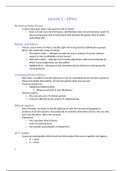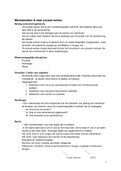Samenvatting
Business Ethics Summary
- Vak
- Business Ethics
- Instelling
- Universiteit Twente (UT)
This is a complete summary for the course 'Business Ethics', taught during the 3rd year of the Bachelor 'International Business Administration'. It includes all the required reading and lectures. With this summary, I got an 8.8 on the exam.
[Meer zien]






